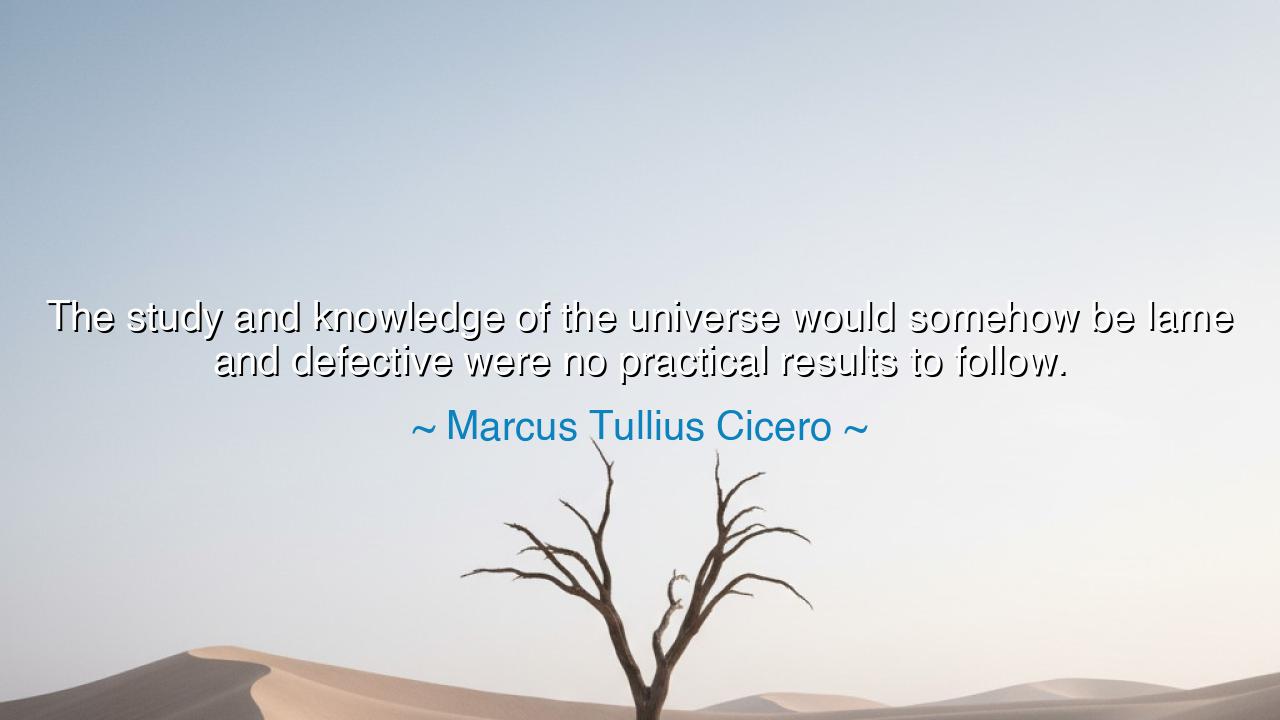
The study and knowledge of the universe would somehow be lame and
The study and knowledge of the universe would somehow be lame and defective were no practical results to follow.






Hear the voice of Marcus Tullius Cicero, the Roman orator, philosopher, and statesman, who proclaimed: “The study and knowledge of the universe would somehow be lame and defective were no practical results to follow.” In this saying lies a wisdom that echoes across centuries—that knowledge, though noble in itself, finds its true worth only when it serves life, when it is applied to the bettering of mankind. To contemplate the heavens is wondrous, but to let that contemplation remain sterile is to halt the journey halfway. Knowledge must not only illuminate the mind—it must strengthen the hand, guide the heart, and uplift the world.
The ancients often held this tension between speculation and application. The philosophers of Greece pondered the movements of the stars, yet it was the engineers of Rome who turned knowledge into aqueducts, roads, and arches that still endure. Cicero, living in an age when Rome struggled between lofty ideals and harsh realities, recognized that thought without action becomes barren, while thought married to deed becomes civilization. The study of the universe is glorious, but if it brings no practical fruit, Cicero deemed it defective, as a tree that blossoms but never bears.
Consider the life of Galileo. His study of the skies revealed the moons of Jupiter, the phases of Venus, the truth that the earth itself moved. These were not idle musings; they overturned centuries of false authority and reshaped navigation, physics, and man’s understanding of his place in creation. The knowledge of the universe that Galileo pursued yielded results both practical and profound, guiding sailors across seas and liberating minds from superstition. Here Cicero’s wisdom stands revealed: study must not end in the scholar’s chamber, but must step forth into the world, changing how men live.
History shows, too, the tragedy when knowledge is hoarded and not applied. In ancient China, great inventions such as gunpowder and the compass were discovered long before they transformed the West. Yet because they were not always applied broadly, their world-changing potential was delayed. Knowledge unused is like treasure buried in the earth: it enriches no one. Cicero’s warning reminds us that to leave study without results is to betray its very purpose.
The deeper meaning of Cicero’s words is this: wisdom is not only to know, but to act. The universe invites us to wonder at its mysteries, but it also asks us: “What will you do with what you know?” To contemplate the stars but ignore the suffering of man is vanity. To understand principles but never apply them to justice, to health, to peace, is to leave knowledge crippled and incomplete. The harmony of true wisdom lies in joining contemplation with action, theory with practice, the eternal with the present.
The lesson, then, is clear: pursue knowledge not as ornament, but as tool. Study deeply, but do not stop at wonder—ask how this truth may heal, how it may build, how it may serve. Let your learning bear fruit in your work, your service, your choices. For in this lies the fullness of human purpose: not to admire the universe from afar, but to take part in it through deeds that reflect the truths we discover.
Practical action flows from this wisdom: if you are a student, ask how your study may serve others. If you are a worker, seek to improve your craft with the light of knowledge. If you are a leader, apply what you know not for vanity, but for the strengthening of your people. Let no truth lie dormant, but give it flesh in your actions. In this way, you will honor Cicero’s teaching, and your life will be a bridge between the mysteries of the universe and the needs of the world.
So remember always: the study of the universe without practical result is lame and defective. Let your knowledge live through your deeds, and you will not only understand the world—you will transform it. For wisdom fulfilled is not only seen in the mind’s illumination, but in the enduring works of hands guided by truth.






AAdministratorAdministrator
Welcome, honored guests. Please leave a comment, we will respond soon